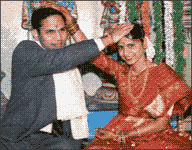 Horoscope Matching(sample)
Horoscope Matching(sample) |
 Melapak Report
Melapak Report |
 Astrology Services
Astrology Services |
 Astrology Books
Astrology Books |
 Aryabhatt Shopping
Aryabhatt Shopping |
 Shaadi Muhurats
Shaadi Muhurats |

|
|
|
|
|
|
|
THE MARRIAGE CEREMONY OF THE KANNADS
- Naandi
 Naandi is performed separately at bride as well as groom's
house. This is to ensure that the marriage takes place despite any
circumstances.
Naandi is performed separately at bride as well as groom's
house. This is to ensure that the marriage takes place despite any
circumstances.
- Kaashi
Yatre
A very old ritual Kashi Yatre, here the groom pretends
to be very angry as nobody is searching for a bride for him. He announces
Brahmacharya. This is when his maternal uncle convinces him and puts forth him
the girl that he has chosen for him or would offer his daughter's hand for
marriage.,/FONT>
- Dev
Karya
Traditionally this ritual was performed on the day of
arrival of the groom's family to the village. All the goods that were to be
exchanged or used in the marriage were placed in front of Lord Ganesha to seek
blessings from the Lord. On the same day haldi is applied to the bride as well
as the groom in their respective houses. Another ritual is where the Uddin Murth
a type of grain is ground. This is considered to be
sacred.
WEDDING
RITUALS
- The
Pujas
On the day of marriage the first ritual that is
performed is the Mandap Puja. This is to make the mandap or the hall in which
the marriage is to take place, appropriate for an event as sacred as a marriage.
The bride's father brings the groom to the mandap and is worshipped in a
ceremony called the Var Puja. The bride's parents honour him by washing his feet
and offer him a silk dhoti and pitambar, which are to be worn by him. When she
is brought in the mandap no one is supposed to see her face, so her sister
shields her face with a fan of peacock feathers.The bride and groom stand on the
either side of a white cloth, which separates them. The bride and the groom
garland each other amidst the chanting of mantras. The groom's sister holds a
kalash of holy water that contents a coconut, beetle leaves and Kombu
Gindi.
- Dhare
Herdu
Dhare Herdu symbolises handing over of their daughter
to the groom. The groom holds the bride's hand with a coconut and beetle leaves,
while her parents sprinkle the holy water on their hands. After that the
mangalsutra is tied around the girl's neck.
- Saptapadi
Saptapadi the ceremony of
the couple taking seven rounds of the havan or the holy fire. In most marriages
a game called Okhli is generally played, the groom's wedding ring is dipped in a
vessel containing coloured water. The bride and her brother are expected to
search for the ring thrice.
POST-WEDDING
RITUALS
- Graha
Pravesh
After the wedding ritual of entry of the bride
into her new home is called Graha Pravesh. The bride kicks a kalash full of rice
with her right foot kept at the threshold of the house. Then comes the name
change ceremony. Here the groom decides a name for his bride he inscribes with a
ring on a plate containing rice. On the second day the bride's family comes to
take the newly wedded bride and the groom to their house. The couple stays at
the bride's place for a few days. Later the groom's family goes over to their
in-laws place to fetch the bride and the groom.
- Clothes
The grooms family gives the bride five sarees each meant for an occasion.
A nice saree meant for the Dare Puja, a Kanjivaram saree for the wedding,
a simple saree for haldi, a saree for the puja
and a saree for the girl to sit on when she comes to the groom's house after
graha pravesh are must. The bride is made to sit on a saree after coming to her
new house, this saree is later given to her. The groom on the other hand wears a
silk dhoti and a pitambar, which is a cloth meant to cover the upper part of his
body and has a zari border. The reception is fixed in the evenings. The food is
simply delicious and one shouldn't miss this part. The ceremony ends with each
guest from the groom's side being handed out a coconut and sweets wrapped in a
packet.
|
|


 Naandi is performed separately at bride as well as groom's
house. This is to ensure that the marriage takes place despite any
circumstances.
Naandi is performed separately at bride as well as groom's
house. This is to ensure that the marriage takes place despite any
circumstances.